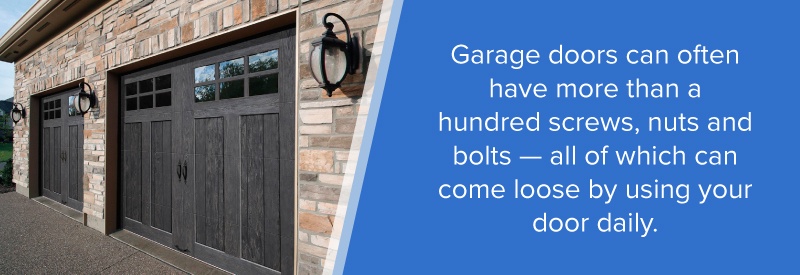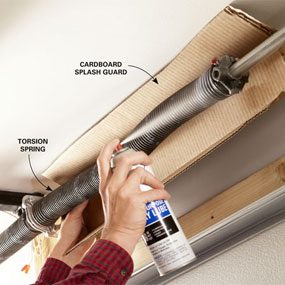Table of ContentsHow To Fix A Noisy Garage DoorWhat To Do About Your Noise Garage DoorGarage Door SilencerCreaks, Groans, And Rattles: Noises In Your Garage Door
Lot of times, the sound you're speaking with your garage door is straight connected with the opener. If your garage door opener all of a sudden appears louder than typical, it could be an indication that it's using out and coming to the end of its time. Nevertheless, before you decide to get a brand-new garage door opener, there are a couple of things you can check that'll salvage your existing opener.
This is a typical maintenance job related to chain driven openers. Another cause of a noisy garage door deriving from the opener is that the inner-workings are worn out. Take an appearance at your opener's manual and make modifications from there. If you're uncomfortable doing so, contact your regional repair work service.
As this is the most extreme measure to take for a loud garage door, you ought to check everything to make sure you didn't miss the cause of the noise. Usually, an old and worn out garage door will be loud no matter what. For instance, a dinged up aluminum one or a decomposing wood garage door are both lost causes.
Unlike wood and aluminum, a steel garage door will stand the test of time and won't rot, swell, warp or damage. They're made for the Midwest. Just the garage door isn't sufficient though. You require to match that door with a quality opener and outstanding setup. If your garage door is not appropriately installed, it'll start making sounds in no time.
We have actually been serving the Midwest for over 40 years and have all the skills and experience essential to do the job right. Our installers are factory skilled and accredited in order to make sure that your garage door gets set up properly and effectively. So, if you can't discover the source of your noisy garage door and have actually exhausted all other choices, get a free quote now for a new garage door from Feldco that'll stay quiet and keep you and the next-door neighbors happy.
My Garage Door Opener Is Making A Lot Of Noise
 Fyi: When To Diy And When Not To Diy Garage Door Repairs
Fyi: When To Diy And When Not To Diy Garage Door Repairs
It can be annoying to have a garage door that rattles, squeaks, and squeals as it opens and closes. Some property owners claim they can hear and feel their garage door opening in every room in the home. It can be a nice warning signal, but ultimately it's the extra sound that you could do without.
Garage doors create vibrations throughout opening and closing. This leads to loud and disruptive noises. It might not be a problem throughout the day, but if you are trying to sleep, it can be disruptive. Minimize the vibrations, and you will reduce the noise level. You don't require to change your garage door or door opener with a quieter design, simply do a little upkeep.
Make certain whatever is snug. Be mindful not to over-tighten. Garage doors have moving parts that need to be maintained. Spray the top of the springs with lubricants, using enough oil or lubricant to flow down to the base of the springs. Spray the within each track and around all the metal rollers.
See and figure out if the chain is sliding easily around the gears. Spray the hinges in between all the panels. Any moving part can cause vibrations. Keep garage sound to a minimum by lubing moving parts at least twice a year. Be liberal when utilizing spray lubes. Inspect the rollers on your garage door.
 How To Tell If You Should Fix Or Replace A Garage Door
How To Tell If You Should Fix Or Replace A Garage Door
Nylon rollers are much quieter, do not need lubes, and need less upkeep than metal rollers. Nylon garage rollers aren't a lot more pricey, and the noise reduction is worth the money. Standard five-section garage doors require a dozen rollers. If you are changing your rollers, do them at one time.
What To Do About Your Noise Garage Door
Pieces of rubber used as buffers for the garage door and the door openers will help you lower sound. Prior to working on your door and opener, unplug the motor of the door opener. Place a durable ladder under the door and rest the door on the ladder. Get rid of the door opener motor from its installing bracket and location it carefully on the floor or your workbench.
Slide a piece of rubber about 1/4 inch wide between the door and the bolts. Tighten up the bolts. Next, eliminate the bolts holding the door to the support frame. Utilizing thick rubber, cut two rectangular pieces, drill two holes, and bolt one end to the frame of the garage door opener.
Suspend the opener from the frame by the rubber pieces. The rubber will absorb noisy vibrations prior to they trigger the metal assistance frame to shudder. Check the garage door and opener to make certain that they still work appropriately. You might need to readjust your garage door locks after dealing with the bolts and gaskets.

Expect the lock bar hitting the track, making sounds and not capturing. When your door moves up and down, misalignments can cause grinding sounds. Discover the L-shaped leader brackets attached to the door. Undo the screws and tap the guide up or down; depending on how the positioning is off, tighten up the bolts and screws and repeat on the other guide.
With a missing insulation strip, you will feel cold and damp entering your garage and hear a loud banging noise when the door is closed. You can easily replace this strip by getting rid of https://www.johnsgaragedoorrepair.com/reviews/ the old one and purchasing a roll of rubber insulation from your regional lumber or garage door shop.
Noisy Garage Door, Easy Diy Fixes
Slide-out the old and worn strip and move the brand-new rubber through the tracks in the door. View as you godon't get ahead of yourself and cut the insulating strip too brief. If the strip is too long, that's okay; you can change it later. Rubber insulation will diminish, so don't suffice to fit your door width precisely.